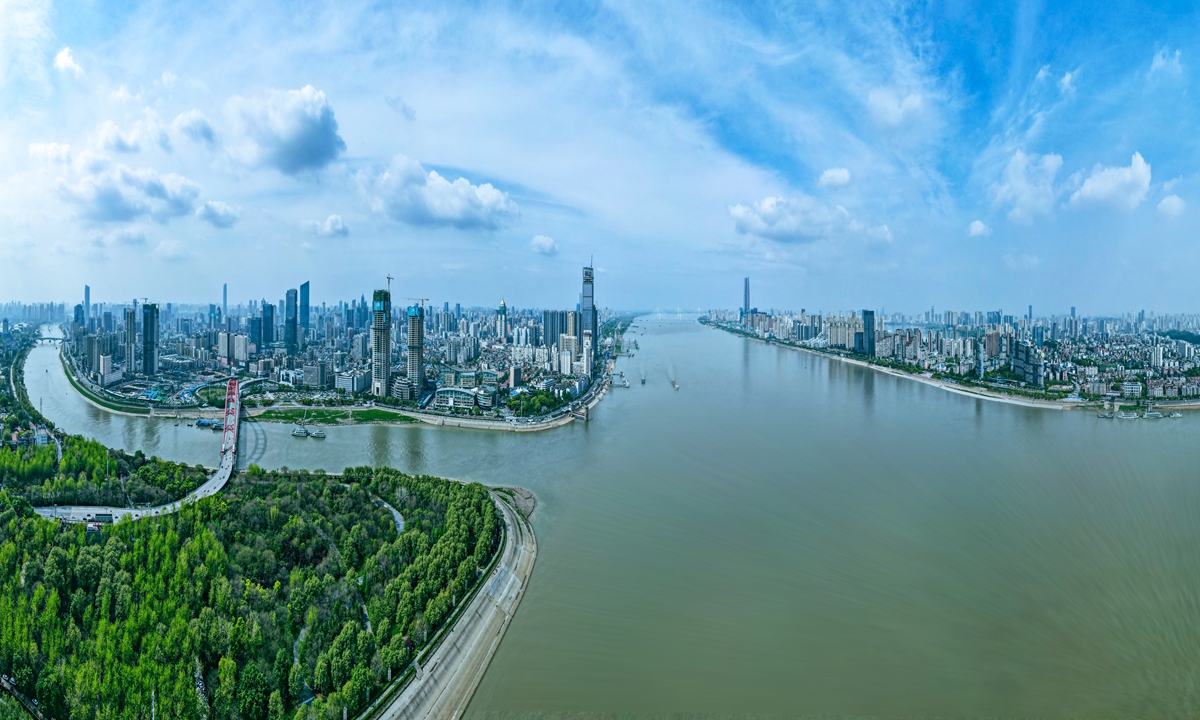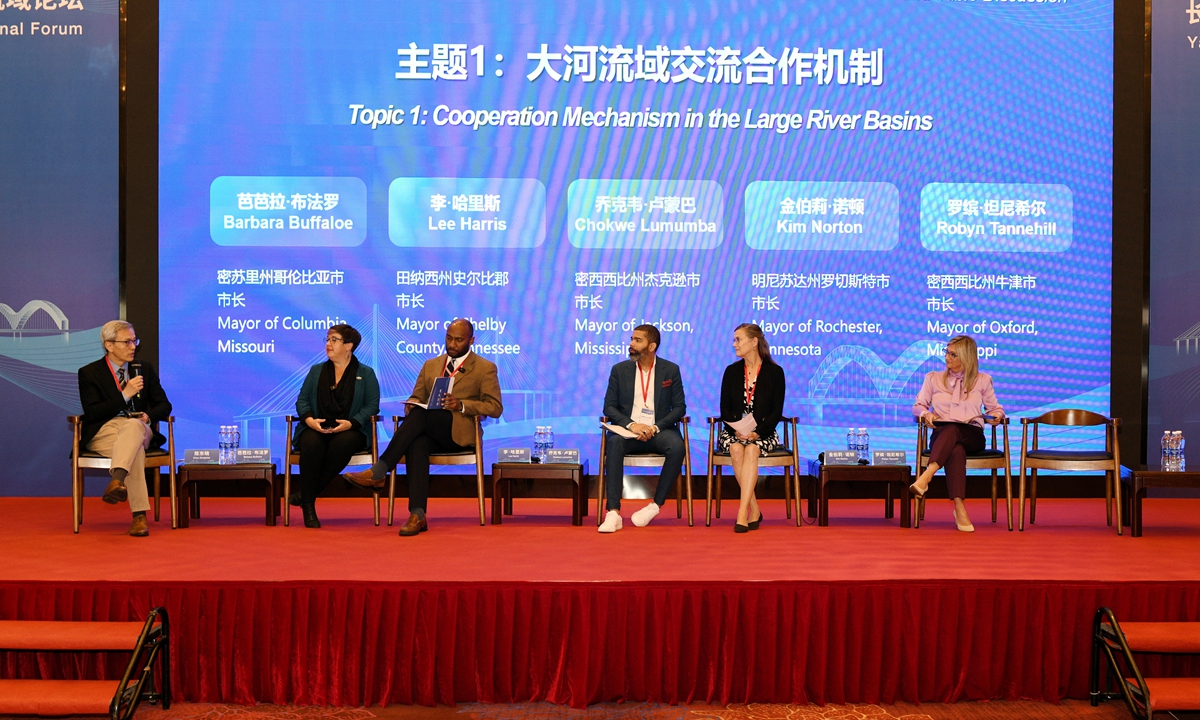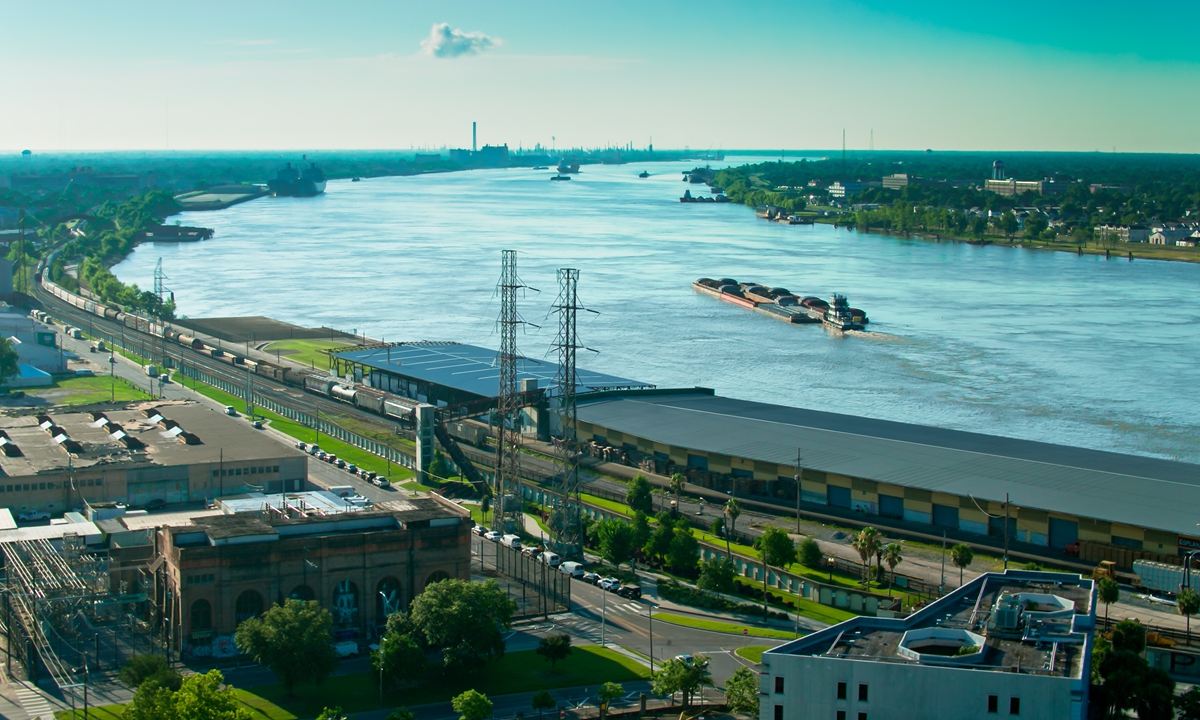Cooperation on Yangtze, Mississippi witnesses China-US friendship, people-to-people exchanges
Bridges on mother rivers

Yangtze River Photo: VCG
Jim Brainard saw the Yangtze River for the first time on a fine autumn day. The wide and vast river reminded the US official of the Mississippi River, which he knows well as being equally magnificent and almost boundless.
Brainard is the Mayor of Carmel, Indiana. He was also the head of a delegation of six US city mayors from the American heartland areas along the Mississippi River. Earlier this month, the delegation visited Wuhan, Central China's Hubei Province, in the middle reaches of the Yangtze River, as well as the nature reserves on Shanghai's Chongming Island at the river's estuary.
"The Yangtze River is a beautiful part of China, and it is similar in some ways to our Mississippi water area," Brainard told the Global Times during his stay in Shanghai. "The two rivers are important to both of us, to both countries."
For centuries the Yangtze River and Mississippi River, the mother rivers of China and the US respectively, have nurtured a rich variety of life and brought communication and development.
During the 12-day trip in China, the delegation, along with several US scholars in the environment and hydrology fields, had deep conversations with their Chinese peers on both countries' experiences in river protection and watershed area development, as an effort to build "bridges" of cooperation and friendship between the two big rivers.
The hope of the China-US relationship lies in the people, its foundation is in our societies, its future depends on the youth, and its vitality comes from exchanges at subnational levels, Chinese President Xi Jinping noted on Wednesday during his Asia-Pacific Economic Cooperation (APEC) trip in San Francisco.
"I welcome more US governors, Congressional members, and people from all walks of life to visit China," Xi said.
Xi's words and his recent visit to the US inspired people in the two countries who yearn for more exchanges, from government officials and scholars, to ordinary people, as the China-US relationship - one of the most important bilateral relationships in the world - is gradually improving through not only head-of-state diplomacy, but also the frequent sub-national and people-to-people exchanges, observers said.
US mayors share their experiences and thoughts on large river basin cooperation mechanism at the Yangtze-Mississippi Forum, on November 6, 2023. Photo: Courtesy of Shanghai People's Association for Friendship with Foreign Countries
A sense of affinity
Brainard and many members of the US mayors' delegation felt a sense of affinity during their trip to China, although they'd never been to this distant Eastern country before. "The rivers and valleys are very much the same," Brainard said in a speech he delivered at the Yangtze-Mississippi Forum held in Shanghai on November 6.
The word "similarity" was mentioned by many Chinese and American officials and scholars at the forum. Yangtze River is "similar in many ways to the Mississippi - broad, flat, and used for transport," said Gabriel Filippelli, executive director of the Indiana University Environmental Resilience Institute who also attended the forum.
In an interview with the Global Times, Filippelli recalled what he saw at the Yangtze River for the first time as a tourist years ago: He traveled near the river on his entire trip, over it, and visited various related waterways along the way. He felt that the Yangtze and Mississippi shared a similar appearance, and played a vital role in the history and development of both countries.
Many Chinese environment and hydrology scholars who've been to the US also feel a sense of affinity when seeing Mississippi River in person.
Zhang Weiguo, a professor at the State Key Laboratory of Estuarine and Coastal Research (SKLEC) at East China Normal University, participated in a cooperative project at the Louisiana State University (LSU) in December 2019. During his one-week stay, Zhang visited the Mississippi River with his US colleagues, where he saw a body of water as wide as the Yangtze River, riverside wetlands, deciduous trees with some of their branches reaching into water, alligators basking on warm mud, and crayfish caught by local fishermen, which "tasted similar to the Chinese ones," he recalled.
"I heard that crayfish are originally from Louisiana. And now they are widely farmed in China as well, especially along the Yangtze River," Zhang told the Global Times.
"From the very small crayfish case, I felt that the two rivers, although far away from each other, have a lot of connections."
Mississippi River Photo: VCG
Broader, more inclusive communication
In Shanghai, the US mayor delegation and some US scholars visited the city's Chongming Island. On what is dubbed as China's third-largest island, they visited a national nature reserve, a Chinese sturgeon protection base, a domestic sewage treatment station, and the Qingcaosha Reservoir that supplies fresh water to 13 million residents in Shanghai.
Brainard said that they had wonderful time on learning about China, as well as its efforts in protecting rivers and restoring the wetlands. He believes there are many joint efforts China and the US can make in protecting their rivers.
"We need to do much work to improve the quality of water in the Mississippi River and keep agricultural chemicals from polluting the river. China needs to do the same thing as well. I hope that we can learn from each other on what does and doesn't work, and collaborate on making both our famous rivers more sustainable," Brainard.
Nina Lam, E. L. Abraham Distinguished Professor of Department of Environmental Sciences at the LSU, also participated in the Chongming visit. There Lam had the chance to see the Yangtze River again.
"It (the river) is always beautiful," she told the Global Times after the visit. "I was especially impressed with the transportation infrastructure such as the bridge, tunnel, and roads built to link the island with the inland."
Lam recalled that the first time she saw the Yangtze River was in December 1985, when she was collaborating with the then Nanjing Institute of Geography on a project using a geographic information system (GIS) approach to study the cancer mortality patterns in China.
China and the US have long cooperated in the academic field of river, estuary, and delta related researches. The SKLEC and its predecessor institutes, for instance, have had academic exchanges with the LSU since the 1980s, when China had just launched its reform and opening-up, according to Zhang. Their cooperation covered physiognomy in the beginning, and later ecological wetlands and estuaries. It will involve broader and more comprehensive aspects, Zhang added.
"Industrialization occurred earlier in the Mississippi River basin than it did in the Yangtze River basin, and the two rivers and estuaries face similar challenges partly caused by human activities like excavation of canals," Zhang told the Global Times. "Therefore, some experiences by the US in dealing with the Mississippi are worth learning from for us."
The academic exchanges between SKLEC and LSU continued online during the COVID-19 pandemic. For decades, scholars and young students from the two sides have engaged in deep cooperation, said Zhang.
To increase exchanges between our two peoples, especially between the youth, China is ready to invite 50,000 young Americans to China through exchange and study programs over the next five years, announced President Xi in a speech delivered at the Welcome Dinner by Friendly Organizations in the US, on November 15.
Many Chinese and US scholars and students reached by the Global Times applauded the broader exchanges between the two countries. "I believe that the communication between China and US, just like the two big rivers, will be broader and more inclusive," said Zhang.
A shared future
At the Yangtze-Mississippi Forum in Shanghai, officials and scholars from various countries witnessed the unveiling ceremony for the International Research Center for Rivers and Deltas, an institute at the ECNU to strengthen transnational academic cooperation in the field of rivers and deltas.
The new center will serve as an international collaboration platform so that people can discuss sustainable development methods in river basins and estuarine areas, said He Qing, director of SKLEC.
"Watersheds and estuaries are an inseparable system," He told the Global Times after the forum. "It is of great significance for global people living in different natural ecological environments and population densities to learn from each other."
Echoing He, some US scholars said they expect China and the US, as well as other countries involved, to have more transnational cooperation on river, estuary, and delta protection.
"As far as I know, there have been many cooperative projects between delta researchers in the two countries. However, very few studies have been on the human side, and even fewer on analyzing the delta as a coupled natural-human system," Lam told the Global Times.
"This type of research is difficult to carry out, thus cooperation between the two countries and learning from each other's experiences and perspective will definitely help, leading to much improved understanding of the deltas and solutions to their challenges," she added.
Speaking of the Yangtze and Mississippi rivers, Filippelli suggests that more cooperation can take place on climate resilience and green economic development between the leaders and scholars of the two countries.
"In particular, opportunities exist to share common approaches to mitigating the impacts of flooding, and share the science and practice of urban greening initiatives for environmental improvements and public health," he told the Global Times.
Finding the right partners can help in finding new solutions not only for local problems, but also to help "inform and reengage us on the national level and bilateral level between our two countries," Daniel Delk, deputy Consul General of the US in Shanghai, said at the forum. "I'm excited about the opportunities that may come not this day, but in the months and years ahead, to form new partnerships," he said.
According to the forum's organizers, a similar forum that will also focus on the Yangtze River and Mississippi River is going to be held in the US in 2024. At that time, the American side will invite related Chinese guests to the US.
As Xi noted in his November 15 speech, the foundation of China-US relations was laid by two peoples. The anticipated reunion on the Mississippi River is a vivid example of the continued improvement in subnational and people-to-people exchanges between China and the US, observers pointed out.
China and the US share a community of shared future, in terms of the frequent economic exchanges between and the common environmental responsibilities shared by the two countries, Zhang said.
As a scholar in the environment and river deltas, Zhang said he is pleased to see China and US spend joint efforts in addressing challenges including economic development and global climate change. "I'm looking forward to more cooperation and exchanges between the two countries, which will benefit the whole of human society," he said.
